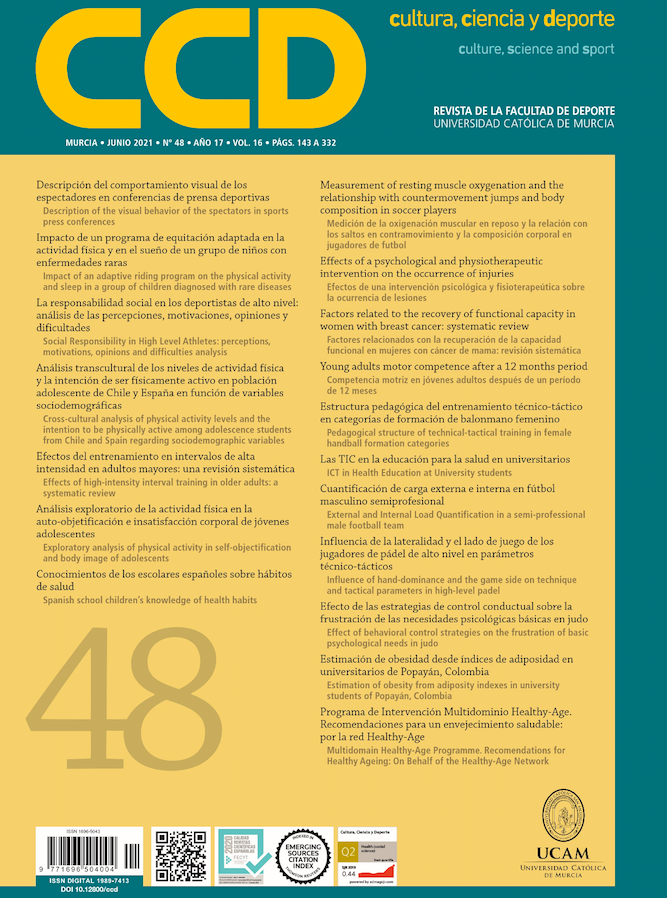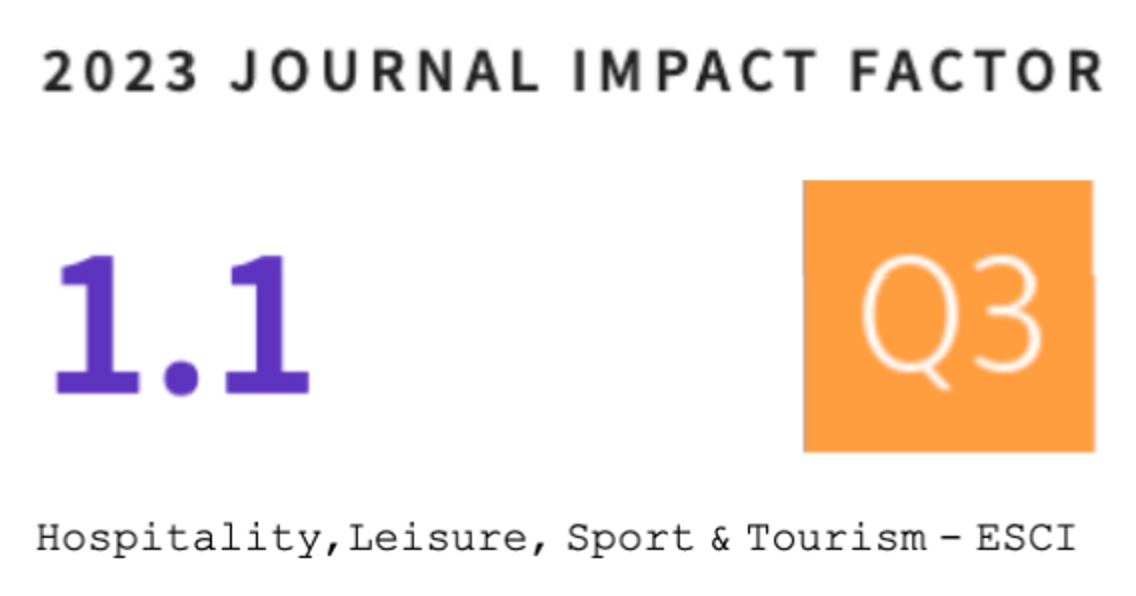Efecto de las estrategias de control conductual sobre la frustración de las necesidades psicológicas básicas en judo (Effect of behavioral control strategies on the frustration of basic psychological needs in judo)
DOI:
https://doi.org/10.12800/ccd.v16i48.1752Palabras clave:
Judo, control interpersonal, frustración necesidades psicológicas (Judo, interpersonal control, psychological need thwarting)Resumen
El objetivo del presente estudio fue analizar las relaciones que se establecen entre los factores que componen el estilo interpersonal controlador del entrenador y la frustración de las necesidades psicológicas básicas, así como identificar las diferencias que puedan existir a nivel de categorías y horas de entrenamiento en judocas competidores (M = 22,78; DT = 5,80). Se realizaron análisis descriptivos y de correlación de todas las variables. Para analizar las diferencias en las categorías y horas de entrenamiento se llevaron a cabo las pruebas U de Mann-Whitney y Kruskal-Wallis, respectivamente. Los resultados mostraron diferentes correlaciones significativas entre las dimensiones del estilo controlador y la frustración de las necesidades psicológicas básicas. Además, se hallaron diferencias significativas entre categorías en la frustración de las tres necesidades psicológicas básicas y en la atención condicional negativa. Todas las dimensiones del estilo controlador del entrenador mostraron diferencias significativas en las horas de entrenamiento semanales. Estos resultados apuntan a que las técnicas de control de los entrenadores pueden influir sobre la frustración de las necesidades básicas de los judocas competidores según su categoría o sus horas de entrenamiento.
===
The objective of the study was to analyze the relationships between the factors that compose the coach’s controlling interpersonal style and the frustration of basic psychological needs, as well as to identify differences between category and training hours in competing judokas (M = 22.78; SD = 5.80). Descriptive and correlation analyses were performed. In order to analyze differences in the categories and training hours, the Mann-Whitney and Kruskal-Wallis U tests were conducted respectively. Results showed significant correlations between the dimensions of the controlling style and the frustration of basic psychological needs. Moreover, significant differences were found between categories, in the frustration of the three basic psychological needs and in negative conditional attention. All the dimensions of the coach’s controlling style showed significant differences in terms of weekly training hours. These results suggest that the coaches´control could influence the judokas´ frustration of the basic needs according to their category or their training hours.
Citas
Aguirre, H. B., Tristán, J. L., López, J. M., Tomás, I., & Zamarripa, J. (2016). Estilos interpersonales del entrenador, frustración de las necesidades psicológicas básicas y el burnout: un análisis longitudinal en futbolistas. Retos, 30, 132-137.
Balaguer, I., González, L., Fabra, P., Castillo, I., Mercé, J., & Duda, J. (2012). Coaches’ interpersonal style, basic psychological needs and the well- and ill-being of young soccer players: A longitudinal analysis. Journal of Sports Sciences, 30(15), 1619-1629.
Bartholomew, K. J., Ntoumanis, N., & Thøgersen-Ntoumani, C. (2010). The controlling interpersonal style in a coaching context: Development and initial validation of a psychometric scale. Journal of Sport & Exercise Psychology, 31, 193-216.
Bartholomew, K., Ntoumanis, N., Ryan, R., & Thøgersen-Ntoumani, C. (2011). Psychological need thwarting in the sport context: Assessing the darker side of athletic experience. Journal of Sport and Exercise Psychology, 33, 75-102.
Bartholomew, K., Ntoumanis, N., Ryan, R. M., Bosch J. A., & Thøgersen-Ntoumani, C. (2011). Self-Determination Theory and Diminished Functioning: The Role of Interpersonal Control and Psychological Need Thwarting. Personality and Social Psychology Bulletin 37(11) 1459–1473. doi:10.1177/0146167211413125
Cano, F., Montero, C., Cervelló, E., & Moreno-Murcia, J. A. (2018) Influencia del estilo interpersonal del entrenador sobre la motivación en deportistas de salvamento y socorrismo. Cuadernos de Psicología del Deporte, 18(1), 173-182.
Cantú-Berrueto, A., Castillo, I., López-Walle, J., Tristán, J., & Balaguer, I. (2016). Estilo interpersonal del entrenador, necesidades psicológicas básicas y motivación: un estudio en futbolistas universitarios mexicanos. Revista Iberoamericana de Psicología del Ejercicio y el Deporte, 11(2), 263-270.
Castillo, I., González, L., Fabra, P., Mercé, J., & Balaguer, I. (2012). Controlling coach interpersonal style, basic psychological need thwarting, and burnout in young soccer players. Cuadernos de Psicología del Deporte 12, 143–146.
Castillo, I., Tomás, I., Ntoumanis, N., Bartholomew, K., Duda, L., & Balaguer, I. (2014). Psychometric properties of the Spanish version of the Controlling Coach Behaviors Scale in the sport context. Psicothema, 26(3), 409-414. doi:10.7334/psicothema2014.76
Deci, E. L., & Ryan, R. M. (1985). Intrinsic motivation and self-determination in human behavior. New York: Plenum. doi:10.2307/2070638
Deci, E. L., & Ryan, R. M. (2000). The “what” and “why” of goal pursuits: Human needs and the self-determination of behavior. Psychological Inquiry, 11(4), 227-268. doi:10.1207/515327965PLI1104_01
Deci, E. L., & Ryan, R. M. (2002). Self-determination research: reflections and future direction. Handbook of self-determination research. Rochester, NY: University of Rochester Press.
Delrue, J., Soenens, B., Morbee, S., Vansteenkiste, M., & Haerens, L. (2019). Do athletes' responses to coach autonomy support and control depend on the situation and athletes' personal motivation? Psychology of Sport and Exercise, 43, 321-332. doi:10.1016/j.psychsport.2019.04.003
Hair, J. F., Anderson, R. E., Tatham, R. L., & Black, W. C. (1998). Multivariate Data Analysis, (5th Edition). Upper Saddle River, NJ: Prentice Hall.
Mars, L., Castillo, I., Lopez-Wane, J., & Balaguer, I. (2017). Controlling coach style, basic psychological need thwarting and ill-being in soccer players. Revista de Psicologia del Deporte, 26, 119-124.
Matosic, D., Ntoumanis, N., Boardley, I. D., & Sedikides, C. (2020). Narcissism, beliefs about controlling interpersonal style, and moral disengagement in sport coaches. International Journal of Sport and Exercise Psychology, 18(5), 592-606. doi:10.1080/1612197X.2018.1549580
Morales-Sánchez, V., Crespillo-Jurado, M., Jiménez-López, D., Morillo-Baro, J. P., Hernández-Mendo, A., & Reigal, R. E. (2020). Relationships between Controlling Interpersonal Coaching Style, Basic Psychological Need Thwarting, and Burnout, in Adolescent Soccer Players. International Journal of Environmental Research and Public Health, 17, 1-13. doi:10.3390/ijerph17134909
Morbee, S., Vansteenkiste, M., Aelterman, N., & Haerens, .L (2020). Why Do Sport Coaches Adopt a Controlling Coaching Style? The Role of an Evaluative Context and Psychological Need Frustration. Sport Psychologist, (34)2, 89-98. doi:10.1123/tsp.2018-0197
Ntoumanis, N., Guerrero, M. D., Gadeke, C., & Thøgersen-Ntoumani, C. (2018). Do exerciser weight status and perceived motivation predict instructors’ motivation and beliefs about the exerciser? A test of motivation contagion effects. Body Image, 26, 10-18. doi:10.1016/j.bodyim.2018.05.001
Pineda-Espejel, H. A., Morquecho-Sánchez, R., & Alarcón, E. (2020). Estilo interpersonal del entrenador, competencia, motivación, y ansiedad precompetitiva en deportistas de alto rendimiento. Cuadernos de Psicología del Deporte, 20(1), 10-24.
Pulido, S., Fuentes, J. P., & Jiménez, R. (2017). Análisis de las relaciones entre variables motivacionales y ansiedad en judocas competidores. Sportis. Scientific Journal of School Sport, Physical Education and Psychomotricity, 3(3), 436-453. doi:10.17979/sportis.2017.3.3.1896
Pulido, S., Fuentes, J. P., & de la Vega, R. (2019). Ansiedad competitiva en judokas cadetes: diferencias en género y categoría de peso. Journal of Sport Pedagogy and Research, 5(1), 21-26.
Pulido, J. J., Garcia-Calvo, T., Leo, F. M., Figueiredo, A. J., Sarmento, H., & Sanchez-Oliva, D. (2020). Perceived coach interpersonal style and basic psychological needs as antecedents of athlete-perceived coaching competency and satisfaction with the coach: A multi-level analysis. Sport Exercise and Performance Psychology, 9(1), 16-28. doi:10.1037/spy0000165
Pulido, S., de la Vega, R., & Fuentes, J. P. (2020). Motivación de logro en deportistas de combate de élite: Evaluación objetiva computerizada. Journal of Sport Psychology, (29)1, 75-82.
Quested, E., Ntoumanis, N., Viladrich, C., Haug, E., Ommundsen, Y., Van Hoye, A., & Duda, J.L. (2013). Intentions to drop-out of youth soccer: A test of the basic needs theory among European youth from five countries. International Journal of Sport and Exercise Psychology, 11, 395-407.
Reeve, J. (2009). Why teachers adopt a controlling motivating style toward students and how they can become more autonomy supportive. Educational Psychologist, 44(3), 159-175. doi:10.1080/00461520903028990
Reeve, J., Jang, H. R., & Jang, H. (2018). Personality-based antecedents of teachers’ autonomy-supportive and controlling motivating styles. Learning and Individual Differences, 62, 12-22. doi:10.1016/j.lindif.2018.01.001
Robles, A., Abad, M. T., Robles, J., & Giménez, F. J. (2019). Factores que influyen en el proceso de formación de los judokas olímpicos. Revista Internacional de Medicina y Ciencias de la Actividad Física y el Deporte, 19(74), 259-276. doi:10.15366/rimcafd2019.74.006
Rodrigues, F., Pelletier, L., Neiva, H. P., Teixeira, D. S., Cid, L., & Monteiro, D. (2019). Initial validation of the Portuguese version of the Interpersonal Behavior Questionnaire (IBQ & IBQ-Self) in the context of exercise: Measurement invariance and latent mean differences. Current Psychology, 1-12. doi:10.1007/s12144-019-00374-y
Ruiz, R. (2006). Diferencias de liderazgo en entrenadores de judo a nivel competitivo. Cuadernos de Psicología del Deporte, (6)1, 21-38.
Ryan, R. M., & Deci, E. L. (2000). Self-determination theory and the facilitation of intrinsic motivation, social development, and well-being. American Psychologist, 55(1), 68-78. doi:10.1037110003-066X.55.1.68
Ryan, R. M., & Deci, E. L. (2002). Overview of self-determination theory: An organismic dialectical perspective. In E.L. Deci & R. M. Ryan (Eds.), Handbook of self-determination research (pp. 3-33). Rochester, NY: University of Rochester Press.
Sicilia, A., Ferriz, R., & Sáenz-Álvarez, P. (2013). Validación española de la escala de frustración de las necesidades psicológicas (EFNP) en el ejercicio físico Psychology, Society, & Education, 5(1), 1-19.
Valero-Valenzuela, A., & Manzano-Sánchez, D. (2019). Interpersonal Style of Coaching, Motivational Profiles and the Intention to be Physically Active in Young Athletes. Studia Psychologica, (61)2, 110-119. doi:10.21909/sp.2019.02.776
Descargas
Publicado
Cómo citar
Número
Sección
Licencia
Los autores que publican en esta revista están de acuerdo con los siguientes términos:- Los autores conservan los derechos de autor y garantizan a la revista el derecho de ser la primera publicación del trabajo al igual que licenciado bajo una Creative Commons Attribution License que permite a otros compartir el trabajo con un reconocimiento de la autoría del trabajo y la publicación inicial en esta revista.














